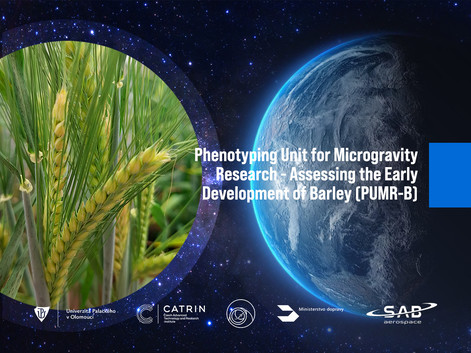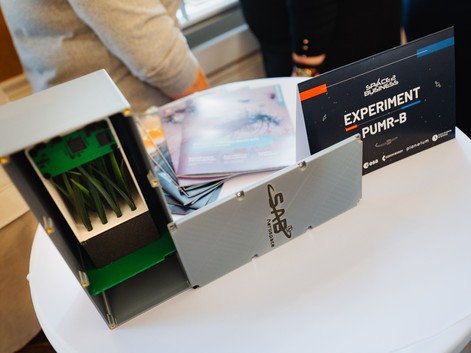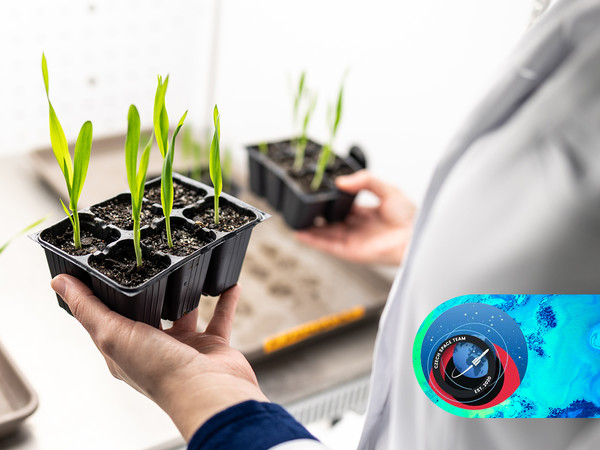Research by scientists from Palacký University (UP) Olomouc is heading into space. Among the 13 experiments that will be part of Czech astronaut Aleš Svoboda’s upcoming mission to the International Space Station (ISS) is an experiment prepared by scientists from the Czech Advanced Technologies and Research Institute (CATRIN) at UP and the Brno-based company S.A.B Aerospace. The bioreactor they have developed will monitor the effect of the space environment on the growth and development of plants, in this case barley. Their findings will then be used not only in long-term space missions, but also for the development of new varieties with higher resistance to extreme conditions.
“Until now, space research on barley has focused primarily on seed viability and malt quality, rather than on understanding the physiological and molecular changes that occur in plants in a microgravity environment. We will now build on our many years of experience studying barley as a model crop and capitalize on our knowledge of plant phenotyping using optical and electrochemical sensors that can non-invasively monitor plant growth and development. By combining a number of scientific disciplines, we will contribute to a deeper understanding of plant physiology,” said Lukáš Spíchal, head of one of the CATRIN divisions and an expert in plant phenotyping.

The project, called Phenotyping Unit for Microgravity Research – Assessing the Early Development of Barley (PUMR-B), focuses on the role of plants as a key component of so-called bioregenerative systems for supporting life in space. Plants provide vitamins, reduce carbon dioxide levels, produce oxygen, and help recycle wastewater. Experts will send a small growth and phenotyping unit measuring only 190 × 60 × 70 mm with a growth and root module that can hold up to 50 barley seeds to the ISS. In the future, it may be expanded to allow experiments with larger plant populations and to assist in the selection of crops suitable for cultivation in space.

“We will design the bioreactor so that we can automatically control and monitor plant growth conditions from Earth. On daily basis, the device will record individual parameters using sensors. This will require minimal crew intervention during the experiment, which will last approximately 12 days,” explained Anna Glozigová from S.A.B Aerospace, representing the industrial partner.
Scientists expect the experiment to bring not only advances in space research, but also new insights for modern agriculture. “Microgravity conditions are very stressful for plants, similar to drought or high temperatures on Earth. These extreme factors not only reduce yield, but also change the ratio of starch and protein in barley. We believe that by exposing barley to a microgravity environment, we will be able to uncover previously unknown molecular and metabolic pathways involved in stress responses. This knowledge can then be used in new breeding programs to develop varieties with greater resistance to extreme conditions,” said the project principal investigator Véronique Bergougnoux of CATRIN.

The European Space Agency (ESA) in the Czech Republic will support the implementation of 13 Czech scientific and technological experiments for the mission of Czech astronaut-in-training Aleš Svoboda to the ISS. A detailed presentation of the experiments took place on Tuesday, October 21, during the Czech Space Week, the largest domestic festival of space activities.
Universities, research institutes, and companies from across the country expressed extraordinary interest in participating in the Czech mission to the ISS. Seventy proposals were submitted in the initial survey. In the subsequent call for detailed proposals, 13 of the 25 submitted experiments were ultimately selected as the most promising in terms of scientific contribution, technical feasibility, and safety of operation on the station.
“The very fact that the experiment involving scientists from Palacký University was successful among dozens of other proposals is a tremendous achievement. The selection criteria could only be met by research projects truly beneficial for the society and its future,” added Michael Kohajda, Rector of Palacký University. The strong demand for Czech research on the ISS was one of the impulses for the creation of the national project Czech Journey to Space.
